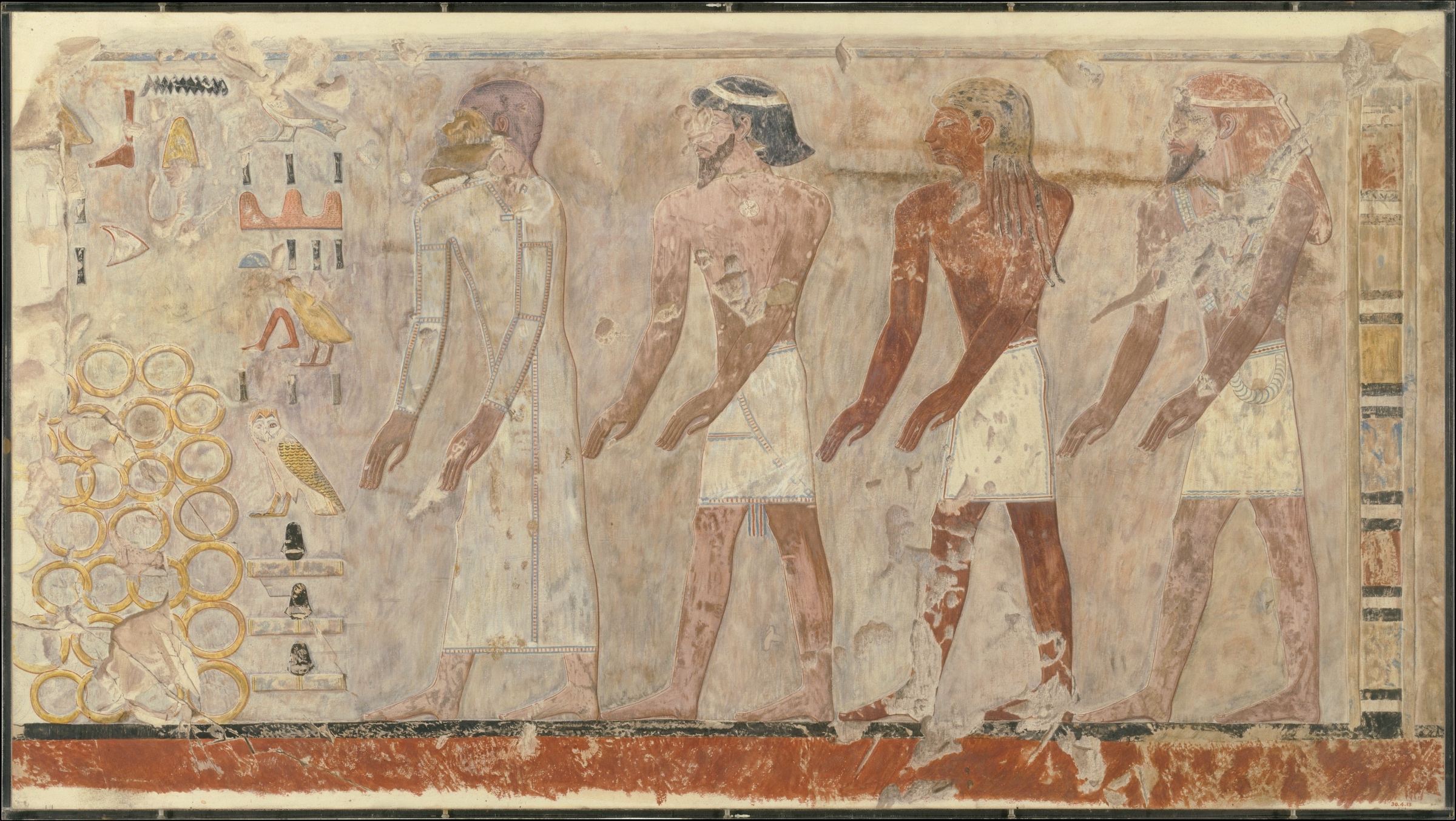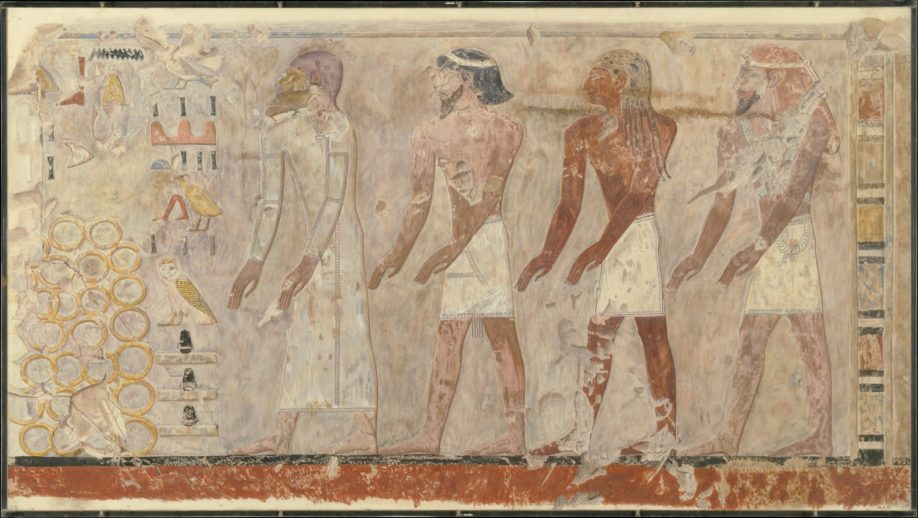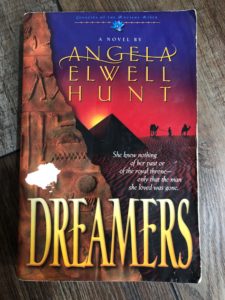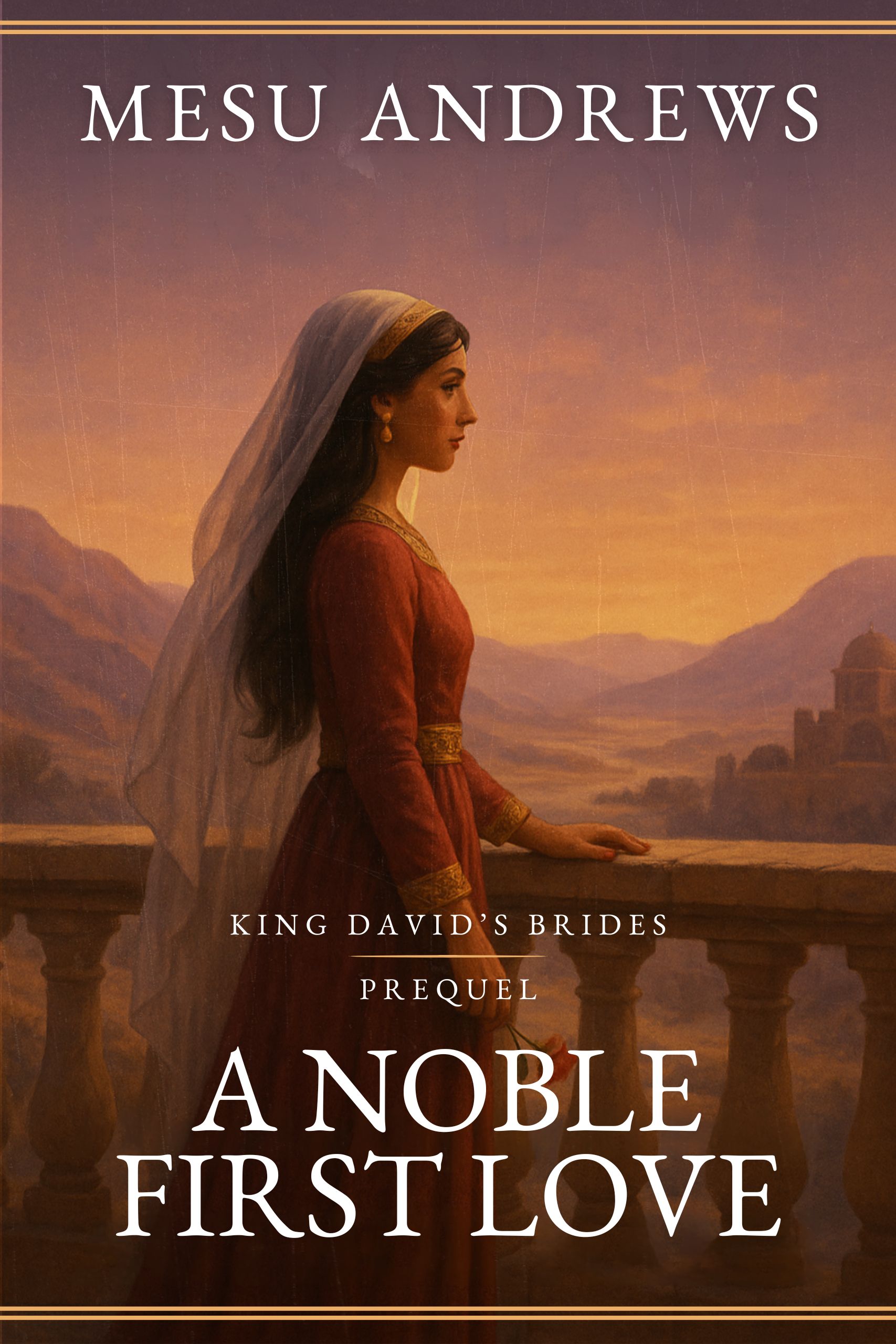
Metropolitan Museum of Art, CC0, via Wikimedia Commons
When you think of ancient pharaohs, do you imagine them with the same skin tones and facial features as the men in the picture below? Until I began researching The Pharaoh’s Daughter in 2014, I thought all pharaohs were “cookie cutter” Egyptians: black hair, dark eyes, and brown skin.
Wow, was I wrong!
Did you know some ancient pharaohs were from Southern Africa, the land of Cush–the nation now called, Sudan? Their skin was midnight black and their facial features distinctive (as discovered in ancient paintings, statues, and tombs).
Other Pharaohs came from Canaan, rulers who sat on Lower Egypt’s throne during a time when the nation was divided. Their skin would have been lighter–olive toned–more like Joseph’s and other tribes/nations of the Levant.
Egypt’s History & Joseph’s Matters
As I’ve mentioned in previous posts, I began studying Joseph’s ancestors years before writing my upcoming release, Potiphar’s Wife (my Amazon aff link). CLICK HERE to read about how Abraham, Isaac, and Jacob’s history might have affected Joseph’s life before and after he lived in Egypt.
“The Midianites sold Joseph in Egypt to Potiphar, one of Pharaoh’s officials, the captain of the guard.” Genesis 37:36
I spent days, weeks, months researching Joseph. Shouldn’t it be obvious which pharaoh Potiphar was guarding when Joseph arrived in Egypt?
Dating Joseph
While trying to date Joseph, I learned one VERY important thing: Every woman and her sister wanted to “DATE” that handsome fella!
Scripture tells us Potiphar’s wife wanted more than a date:
“Now Joseph was well-built and handsome, and after a while his master’s wife took notice of Joseph…” Genesis 39:6–7a
If you’ve read Joseph’s story in the Bible, you know that Potiphar’s wife repeatedly begged Joseph to bed her, but he refused. Furious, she accused him of attempted rape. Then Potiphar unjustly imprisons his favored servant for an undisclosed length of time.
When Joseph was thirty (thirteen years after he was sold into slavery), he earned his freedom by interpreting Pharaoh’s nightmares. Was it the same pharaoh or a different one? The Bible doesn’t say.
But which pharaoh ruled when Joseph ARRIVED?
Here’s a paraphrase from one of the expert sources I consulted early in my research:
“No one can definitively determine the dates for Joseph’s sojourn in Egypt or the pharaoh he served.”
Well, bummer! 😥
Eenie-Meenie-Miney-Moe
In 2002, I read Angela Hunt’s Legacies of the Ancient River series (my Amazon aff link). It was FABULOUS! In fact, it was her writing–along with Francine Rivers’ and Lynn Austin’s–that stirred my passion to begin writing biblical fiction.
But the pharaoh Angie paired with Joseph in her stories directly conflicted with the research I was finding for my story! Yikes!
Unwanted Plot Twist
Oftentimes my research gives me fantastic plot twists that add depth and understanding to Scripture’s Truth. In this case, however, it made me question everything I knew about–well, everything! Had I not written twelve previous books, I might have given up on this project completely!
However, the expert’s quote still rattled around in my brain and actually gave me hope…
“No one can definitively determine the dates for Joseph’s sojourn in Egypt or the pharaoh he served.”
Even now, as I prepare to tell you which pharaoh I believe Joseph served, I admit there are equally sound arguments for other time periods in which Joseph might have lived in Egypt.
Just the Facts, Ma’am
I’ve placed Joseph’s sojourn in Egypt in the Second Intermediate Period (SIP)–1800-1550 BC–during the Hyksos Dynasty. What’s a Hyksos? The term literally means, “foreign rulers,” but research proves them to be displaced Canaanite tribes (primarily Amorites).
They seemed to have overtaken high-ranking government positions–and even Egypt’s throne–by the sheer numbers who emigrated to northern Egypt over time rather than by hostile acts of war.
As I read the academic literature on the Hyksos period, I found many bibliographies referenced the resource, The Political Situation in Egypt During the Second Intermediate Period (my Amazon aff link) by K.S.B. Ryholt. Since scholars quoted him, I thought I should have that book!
Well, Ryholt’s book is now selling for $253.00! 😯 Though I didn’t pay THAT much, I did pay more for this resource than any other I’ve EVER purchased for my library! But it contained crucial information that gave me the confidence I needed to write Joseph’s story.
And the Pharaoh Is…
I gave Potiphar the position of captain of the guard during Pharaoh Khyan’s reign. As you can see above, Rhyholt listed Khyan as the first Hyksos king. Another resource listed him as the third. The Turin King Papyrus–the primary source of dating Egyptian pharaohs–was badly damaged in the section that records the SIP, and scholars have little evidence on names or dates regarding the Hyksos.
Why so woefully deficient in Hyksos’ records? Overall, archaeological evidence implies that Egypt’s Canaanite kings were more interested in boosting trade than recording details (sort of like me with a checkbook–eeek!). 😳
However, two Hyksos kings are affirmed on numerous monuments and records, giving adequate proof of Khyan’s rule and the pharaoh who came after–Apophis.
Three-Layer Writing
Biblical Truth is the foundation upon which I place the building blocks of historical facts, and I use creative fiction like mortar to build a story that (hopefully) feels real and believable. On May 24th, 2022, you’ll meet the historical character, Pharaoh Khyan, in my biblical novel about a very real woman, Potiphar’s Wife (Amazon aff link).
Biblical Truth:
- The Bible records Abraham/Isaac’s land conflicts with the Philistine king(s), Abimelech, because their flocks and herds became so numerous (Genesis 21, 26). A good argument for previous generations of Canaanite tribes fleeing to northern Egypt for the Delta’s rich grazing land.
- Jacob, on his deathbed, bequeathed to Joseph a ridge of land he’d taken from Amorites (Genesis 48:21-22).
Historical Fact:
- Though Scripture never refers to Potiphar’s wife by name, both the Quran and Jewish historical literature give her a name. The Quran spells it Zulaikha, and Legends of the Jews spells it, Zuleika. I went with the Jewish spelling in my book.
- Archaeologists are finding more and more information about the Hyksos Dynasty with their exploration of current-day Tell el-Daba. CLICK HERE to read more about the Hyksos and their history as diplomatic kings–rather than the marauding heathens some historians describe them as.
Creative Fiction:
- In Potiphar’s Wife, Joseph arrives in Egypt as a slave as Pharaoh Khyan is newly crowned king. Khyan appoints his best friend, Potiphar, as captain of his royal bodyguard, bestowing on the crusty soldier an extravagant villa that’s attached to the palace. Potiphar, never having had wealth or such noble position, needs capable slaves–and fast! Joseph proves Elohim’s favor that then spills over onto his master, Potiphar.
But everyone’s life changes with the arrival of–Potiphar’s Wife!
More to Come!
In the three blogs leading up to the release of Potiphar’s Wife, I’ll introduce you to three more important characters:
- March – Who is Joseph?
- April – Who is Potiphar?
- May – Who is Potiphar’s Wife?
Be sure to check back next month to discover if what you THINK you know about these famous (and infamous) characters is true! Or CLICK HERE to sign up for my newsletter, and get exclusive details and inside information about my May 2022 release!
Today’s Question:
- What questions do YOU have about my research process or about Pharaoh Khyan himself?








Comments 20
Zuleika. The only time I’ve heard this name before was on “The Waltons.” There was a lady who lived in town with that name. Her last name was Dunbar. She stayed at Flossie Brimmer’s boarding house. She was a silly woman and I didn’t care much for the character. But the name is awesome!
Author
Wow! That’s so cool! I watched The Waltons as a kid but don’t remember that character! I’ll have to do some research on that. How fun! Thanks for sharing, Alondra. 😘
Pingback: Pondering Joseph & Potiphar's Wife - Mesu Andrews
Pingback: In Feast Or Famine Blog & Newsletter Survey - Mesu Andrews
The Quran never refer the term Pharaoh to refer to the rulers during the time of Joseph, but used the term malik (king) instead. However, during Moses time, the Quran addresess the rulers of Egypt as Fir’awn (Pharaoh).
This is in line with history factsz
Author
Thank you so much, Jeff for this great info! Throughout Potiphar’s Wife, I referred to Apophis as “King” Apophis and Khyan’s son as “Pharaoh” Yanassi though they were co-regents of Lower Egypt. It was mostly to keep them separate in the readers’ minds, but it’s interesting to know that there’s good historical research to support using the term “King” for all rulers in Joseph’s era. Because my books are novels and my audience reads for “edutainment,” I remain as accurate as possible on history while maintaining an Egyptian world that feels familiar and relatable (thus, the mixture of using the terms king and pharaoh). I REALLY enjoy hearing from readers like you who help me with historicity! Thanks again!
Pingback: Dating Joseph In the Faiyum - Mesu Andrews
Yes. The bible leads the idea that the pharoahs were black. Look at all the statues and paintings, did you ever see lips like that on a white person.? Not until today where some woman use botex to make their lips big. Another fun fact, its very very possible that adam and eve were black because they say the garden of eden was situated in africa. That should please the southerners who hate black people . The last laugh! Ps im white, and love every color God made which are all people.
Author
Hi Heather! I’m not sure the Bible leads us to believe anything specific about the Pharaoh’s skin color, but lots and lots of history shows the dynasties of Egypt shifted from northern leadership (lighter-colored skin) to southern kings of Punt (darker-black skin).
The garden of Eden lay between the Tigris and Euphrates rivers.
After the Flood there’s no saying where the original Tigris and Euphrates rivers were. They are not the same rivers as the geography was massively changed by the Flood. People after the Flood adopted familiar names for the rivers, much like the American settlers did with names of towns from England. California is from the Norfolk Broads!
The Hyksos Invasion of Egypt occurred abt 1450 BCE and ended about 1250 BCE. So only 200 years of Hyksos Kings ruled in Northern Egypt. This is now well established in Archaeology. Dudimose (Dedumose II) was the last King or Pharaoh of the 13th Dynasty which ended in 1450 BCE. The succession of Hyksos Kings follows Dudimose’s demise.
Amenemhat III was the King, or Pharaoh of Joseph’s time.
Amenemhet III is also called Amenemmes III, king of ancient Egypt (reigned 1818–1770 BCE) of the 12th dynasty,. It was he who brought the Middle Kingdom Egypt (c. 1738–1430 BCE) to a peak of economic prosperity by completing a system to regulate the inflow of water into Lake Moeris, in the Al-Fayyūm depression southwest of Cairo under the direction of Joseph. It is still called the Waterway of Joseph or The Bahr Yussef today.
Author
Thank you, Darreld. There is much debate about the dating of Joseph’s sojourn in Egypt. I’m familiar with the research you’ve sited. Definitely good information!
Was it Pharaoh Apophis who needed his dream to be interpreted, thus making Joseph the second-in-command? If so, how old do you think Apophis was? Joseph was about 30 years old then. I suspect, according to your post, if Khayan was the king when Joseph was sold to Potiphar around age 17, by the time Joseph turned 30, it had to be a different king, namely Apophis. And considering Khayan only reigned for 10+ years (a pretty short time), I wonder if Apophis became a pharaoh at a young age. That would explain why Joseph claimed later that God made him “father to Pharaoh” (Gen. 45:8). So, if Apophis were indeed much younger than Joseph (30) when he was named him second-in-command, I could see why Apophis would have made such decision as a young king and how that would naturally lead Joseph to play a fatherly figure in Pharoah’s life. I always wondered why Joseph viewed himself as a father to Pharaoh, but this would explain that. Is that how you see it? How old do you think Apophis was when he met Joseph and needed his dream interpreted?
Author
Hi Dan! I don’t believe it was Pharaoh Apophis whose dreams Joseph interpreted for the very reason you stated above. I don’t think Apophis was a child pharaoh, and Joseph was–in the Bible–referred to as “a father to Pharaoh.” Of course, that phrase could have been totally metaphoric in that Joseph gave sage advice and guidance throughout the fourteen years of feast and famine; however, in my research, I found two possibilities (boy fictional but based on historical research) that proposed young pharaohs in both Lower and Upper Egypt during Joseph’s service as vizier. On my very first day of research, I read a leading Egyptologist who said (paraphrased), “No one can ever know the exact dates when Joseph sojourned in Egypt.” I’m neither a biblical scholar nor an Egyptologist. Though I chose to place Joseph during the Hyksos Dynasty, many very smart people have solid reasons (and so-called “proof”) for begin absolutely sure he lived in Egypt decades before or after (some even say centuries before or after). I write fiction, but I chose to research the findings of the two most-quoted scholars in the field of Hyksos research (at the time I wrote #InFeastorFamine): Manfred Bietak and K.S.B Ryholt. Hope that helps! Check out my book, In Feast or Famine, and I believe it will answer most of your questions!
Dear Ms. Mesu: Trying to gain understanding and clarity, in your research, you are persuaded that Joseph serve a Pharaoh between 1800 and 1700 BC? What was the name of the Pharaoh who he served and elevated Him above all, except for himself? Honestly unsure at this point.
But I am persuaded that the Exodus under Moses’ leadership, was most likely closer to 1450 BC and Amenhotep II was the Pharaoh. From Israel’s deliverance from Egypt to the end of the Messiah’s earthly life, is around 1500 years. The Church Age is 2000, coming up to around 2023-33 AD. The 1,000 reign of King Jesus, completes a 7000 year cycle. Adam to Jesus our Messiah King was 4000+ years. Thank you for your in-depth research and providing your answer(s).
God bless!
Kevin M. Hunt- Author of “44 Degrees- the Mystery and Magnitude of the Seasons of Joseph”
Hi Mesu!
Hugs to you sisterfriend!
I soooo loved Potipher’s Wife! Thank you for giving such a new, fresh perspective! Making her so human, giving a reason for us to understand her horrid behavior. I actually liked her, was so happy for her at the end…and I adore how you paint the ancient world so vividly, not so foreign to me anymore. The Lord has used your art to help me so love history! But most of all I think I so appreciate how you translate scripture and no doubt your own sweet relationship with our great M & M. At times HE has confirmed His love, truth, fingerprints or voice in my own life/walk with your characters. Thank you for letting Poppa G-D use you for His glory!
Pharaoh’s Daughter is another favorite too. Too many reasons to have one stand out. But I think if pressed, the way Poppa G-D keeps us as HE keeps His word, even in the difficult and confusing times, we can still know Him and blindly trust His goodness and kinderly tender care.
Author
What an encourager you are, dear one! And I’m so glad to hear Potiphar’s Wife and The Pharaoh’s Daughter have helped your understanding of the Bible’s history and culture as well as opened your heart’s eyes and ears to see and hear from our Poppa G-D. Yes, He can be truly trusted in all things, and His goodness and faithfulness never fails. Bless you, precious sister! ❤️
My question is : Is there any historical proof of the friendship between Potipher and Joseph and the Pharoe and Joseph? Are there any old Jewish literature telling of any stories relating them together in any settings other than the Holy Bible. I absolutely love the story and I would love to learn more of their relationships.
I can’t help but feel Potipher logically never loved Joseph again after his wife went after Joseph. Even though he was innocent. You know how men are. Jealous. I feel Potipher may have never loved his wife the same after that.
But I also am intrigued to know the relationship between the Pharoe himself with Joseph. Were they close in age? Did they grow to be like brothers in each others confidence? It would seem likely to me.
Author
I soooooo wish there were more info about all those details! But if there is, I sure didn’t find it. The Bible seldom gives us the underlying emotions or motivations for the real people’s actions. I’ve often wondered why, and I believe (my opinion) that God left out those emotions and motivations so those who read the stories hundreds and thousands of years later can FEEL what their own emotions and motivations might have been in the same situations. The Bible is God’s Living Word. It speaks new things to me EVERY time I read it–no matter whether I’ve read a passage once or a thousand times.
What I do know about Joseph’s relationship with Pharaoh becomes evident when Joseph’s brothers realize he’s the vizier and are terrified of what he’ll do to them. Joseph says, “It was not you who sent me here, but God. He made me father to Pharaoh, lord of his entire household and ruler of all Egypt.” (Ge 45:8) So, I think you’re right about Joseph’s relationship with Pharaoh remained strong–maybe not as brothers, but more so like Joseph as a mentor to the younger king (which would explain why Joseph was buried like royalty). Hope that helps!